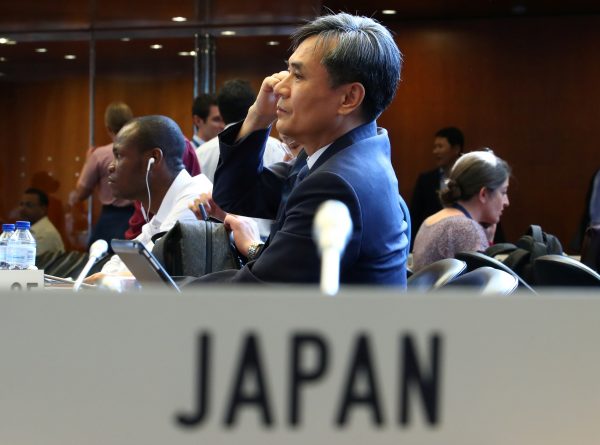Despite this common ground, Japan and South Korea are willing to risk large economic losses and weakening security relations.
The trade war between the two countries began in July 2019 when Japan imposed restrictions on certain chemical exports to South Korea, with the justification that sensitive technology exports to South Korea might have been leaked to countries like North Korea. South Korean citizens responded to the restrictions with large demonstrations and boycotts of Japanese goods.
In August, Japan removed South Korea from its whitelist of countries that do not require prior approval for the trade of certain chemicals and dual-use products. The South Korean government then downgraded Japan to a trade category consisting of non-favoured countries that do not comply with international norms. This resulted in longer bureaucratic procedures for businesses that export goods to each other in both countries.
Behind Japan’s trade restrictions is a South Korean Supreme Court ruling ordering Japanese companies to compensate South Korean forced labourers during Japan’s occupation of the Korean peninsula. Japan holds that a complete settlement regarding the colonial period took place during the countries’ diplomatic normalisation in 1965. The Abe administration has pressured the Moon administration to overturn the verdict but also claims that the Japanese trade restrictions have nothing to do with the court ruling. South Korea rejected Abe’s claim and perceives Tokyo’s trade restrictions as revenge for a non-favourable legal verdict.
The main cause of the conflict is Japan and South Korea’s refusal to recognise each other’s identities. Japan’s experiment with imperialism and militarism in the first half of the 20th century and South Korea’s authoritarian regime during the Cold War were dark periods in the history of each country. Both countries have undergone transformations since then. Japan replaced militarism with pacifism and is championing international cooperation and peace. South Korea introduced democracy in 1987 after a fight against the military dictatorship. The peace culture in Japan and democratisation in South Korea constitute important elements in both countries’ national identities.
Japanese and South Korean citizens are angered when their respective identities are not recognised. A survey in June 2019 showed that only a quarter of Japanese saw South Korea as democratic. In South Korea, only 8 per cent of respondents described Japan as pacifist while half of them described it as militaristic. Another recent survey revealed that 61 per cent of South Korean respondents view Japan as a military threat.
Non-recognition of identity has also taken place within government. Since 2015, Japan’s Ministry of Foreign Affairs has stopped describing South Korea as a country with which Japan shares ‘fundamental values’, among which is ‘democracy’. In August 2019, the South Korean ruling party issued an official denunciation of Japan’s trade restrictions. The statement sought to question Japan’s nature as a peaceful state — it called on Japan to ‘immediately distance itself from pre-war militarism’ and stop its ‘acts of economic aggression’.
Altering diplomatic language is the result of deliberate political decisions and inflames already strained relations. Given that there will be a general election in South Korea in 2020 and that Japanese Prime Minister Shinzo Abe is seeking to add controversial constitutional reform to his political legacy, both sides can be expected to continue to fan the flames of nationalism by demeaning the other.
But it has not always been like this. When former Japanese prime minister Keizo Obuchi and former South Korean president Kim Dae-jung met in 1998, they praised each other’s national identities. Obuchi expressed his ‘admiration’ for South Korea’s development into a ‘prosperous and mature democratic state’, while Kim ‘highly appreciated the role that Japan has played for the peace and prosperity of the international community’. Those exchanges seem distant as the two countries deliberately deny each other’s national identities today.
The denial of a counterpart’s identity also creates erroneous expectations about the counterpart’s course of action and intentions. The Abe administration tried to press the Moon government to change the Supreme Court ruling because Abe shares the belief that South Korea is not a ‘proper’ democracy. This is a fundamental misconception about South Korea’s political system and a mockery of the country’s national identity. Seoul’s tendency to view any unwanted policy change in Japan as a sign of the return of militarism is a misunderstanding of Japan’s intentions and an insult to Japan’s peace identity.
It is crucial that Japan and South Korea take responsibility for the peaceful development of East Asia. To end the conflict, Japan must acknowledge that South Korea is a democracy with independent courts, even when these courts do not rule in Japan’s favour. South Korea needs to recognise Japan’s peace identity and that post-war Japan has played a positive role for world peace. It is in both Seoul and Tokyo’s interests to cooperate on issues related to sustainable growth in the world economy and the regional security situation. Today’s trade war is a step in the wrong direction.
Wrenn Yennie Lindgren is a Research Fellow at the Norwegian Institute of International Affairs (NUPI) and an Associate Fellow at the Swedish Institute of International Affairs (UI).
Eun Hee Woo is an Affiliated Researcher at Freie Universität Berlin.
Ulv Hanssen is a Lecturer at Soka University, Tokyo, and an Associate Research Fellow at the Swedish Institute of International Affairs (UI).
Petter Y. Lindgren is a Senior Economist and Political Analyst at the Oslo Group of East Asian Research (OGEAR).

